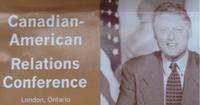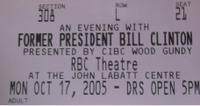My notes from Clinton's speech in London
 Finally getting around to posting my notes from Monday night. Many of my notes were out of order, so I've tried to group his comments under various sub-headings (e.g. Globalization, Climate Change, etc.). The post ends with highlights from his interview with CBC's Susan Ormiston. With a few exceptions, I've tried to limit writing about my own thoughts on his speech so that I don't veer off on too many tangents. Ormiston served as Host & Moderator of the event. The whole evening was billed as the "Canadian American Relations Conference." Ormiston introduced the evening by describing Canada's relationship with the U.S. as one of "nervous dates"; "we just hope that we won't be taken advantage of." First on deck: some dude from CIBC Wood Gundy formally introduced Pres. Clinton. Cue Aretha Franklin intro music:
Finally getting around to posting my notes from Monday night. Many of my notes were out of order, so I've tried to group his comments under various sub-headings (e.g. Globalization, Climate Change, etc.). The post ends with highlights from his interview with CBC's Susan Ormiston. With a few exceptions, I've tried to limit writing about my own thoughts on his speech so that I don't veer off on too many tangents. Ormiston served as Host & Moderator of the event. The whole evening was billed as the "Canadian American Relations Conference." Ormiston introduced the evening by describing Canada's relationship with the U.S. as one of "nervous dates"; "we just hope that we won't be taken advantage of." First on deck: some dude from CIBC Wood Gundy formally introduced Pres. Clinton. Cue Aretha Franklin intro music:The Big Dog comes out!
Clinton began by providing a long list of compliments to his northern neighbours: he professed to admire much about our action on climate change, poverty, and debt-relief. Bill Clinton's been a very frequent visitor to Canada, particularly post-White House; he joked that Martin could make up some of his lumber-tariff-losses by charging him Canadian income-tax.
[click "Read on, MacDuff!" to continue reading]
Globalization: Clinton acknowledged that globalization or "free" trade was not lifting all boats. He pointed specifically to the indigenous poor populations in Bolivia, Ecuador and Venezuela. Clinton also remarked about the growing mistrust of "free" trade in wealthy countries. In this regard, he felt that the Canada/U.S. softwood lumber dispute was the tip of a much bigger iceberg. Clinton sensed that wealthier countries were growing increasingly nervous about ending subsidies to their own farmers (e.g. France, Germany would not go along with the U.K. on this point). Clinton said he was hopeful that countries would find their own best-models in time and pointed to the Danish example of "flex trade" as an interesting compromise from which to learn. He's not sure it was a good idea to advocate China's entry into the WTO. He emphasized that efforts to liberalize trade practices have to "move apace with the march of social justice."
Poverty, disease and education: Clinton was impressed that Canada now allows aid money to be used to buy local (e.g. African) grains instead of over-subsidizing our own farmers. He spoke at length on the need to secure a reliable supply of affordable treatments for AIDS, malaria, TB and other infectious diseases. In terms of education, Clinton lamented the fact that the poorest countries in Africa are also the ones in which families have to pay school fees. Enrollment in school always goes up when the fees are removed.
Darfur: Clinton acknowledged that there is a strong anti-UN sentiment in the Republican Congress but that the U.N. is the only institution that can help in Darfur. During a recent visit to Rwanda for his AIDS project, he found U.S. forces training African union (AU) troops to prepare for helping out in Darfur. Clinton said that the AU needs at least 2X more troops and that no, one country can supply those resources on its own (and stay legitimate). He feels that the UN needs to set up a system that can auto-fund such missions.
What Americans can learn from Canada: Health care! :) General Motors vehemently opposed proposals for expanding healthcare coverage back in 1993/94. Now GM is frightened off of hiring US workers due to the skyrocketing cost of coverage and it's expanding Canadian operations. America spends 15% GDP on health care; 34% of this spending is on administration (the next highest country spends 19%).
Climate Change: Clinton is optimistic about the coming UN conference on climate change in Montréal (28 Nov-9 Dec 2005). He thinks that PM Martin has a real shot at convincing India and China to participate in global climate initiatives. In the 1990s, similar pressures from Clinton/Gore were met with suspicion; India and China believed that Americans were trying to hold them back. So why the attitudinal change? Clinton related an anecdote about visiting a posh Chinese golf course (very ornate--like the Versaille or the Taj Mahal). Clinton was overwhelmed by the dust and pollution due to industry and overdevelopment (dust storms are now frequent). Clinton feels that energy and climate change are the biggest challenges ahead. e.g. Insurance losses in the U.S. have increased a great deal due to the increased frequency of severe weather events. In 50 yrs, if the world continues to warm at the same rate it has in the last 10 yrs, we will lose 50' of Manhattan Island, the most expensive piece of real estate. The tsunami-ravaged Maldives will be completely under water. Biofuel: after Katrina, when Clinton was touring the Gulf coast relief efforts, he met a Florida rescuer who used a biofuel-powered boat to rescue people. The rescuer said biofuel was saving him ~$2/gallon ($1.10/gal vs. $3/gal). Climate change is the only issue that Clinton is not patently optimistic about.
Security: Clinton's biggest concern is securing "loose nukes" and other WMD, particularly in the former Soviet states. He is a strong proponent of international cooperation in security-matters. E.g. the Anti Ballistic Missile Treaty, the Comprehensive test ban treaty, and the Treaty on the Non-Proliferation of Nuclear Weapons. Note that fellow-Canuck, "No BMD Eh", rightly points out Clinton's previous positions on amending the ABM treaty. The former president strongly endorsed the International Criminal Court and lamented his successor's withdrawal from the treaty. Clinton signed on to the ICC just prior to leaving office, Christmas 2000. The former president stressed the importance of international treaties and institutions in dealing with security problems: "You can't jail, kill or occupy all of your enemies."
Three Sources of Hope for the Future:
- Half of the world's population live in nations where they elect their own leaders. This is despite >1.3 billion live in China.
- The internet and communication technology as instruments of democracy. Clinton used the 2002/2003 SARS example: the Chinese government denied the problem for a very long time. It was the "young population" that caused an outcry on the internet and demanded the truth. Eventually the government began cooperating with other affected countries (Canada) and the WHO. Example #2: in the last American presidential election, small contributions over the internet reduced the reliance on big money/corporate donors. This is good for democracy. Example #3: in disasters, the internet brings people closer to experiencing the pain and plight of people around the world and makes it easier for people to send money & assistance.
- The growth of Non-Governmental Organizations (NGOs): there has been a large increase in the number of small & large NGOs in recent years. People feel more empowered to help, with or without the support of official governments.
- Ormiston asked the inevitable question about softwood lumber tariffs. By now, you've probably heard or read about Clinton's position on the Softwood lumber dispute. Position? He doesn't really have strong opinions on this matter but he is sympathetic to our loss of jobs and money and "doesn't see how [Martin] has any other choice" than to be tough with Americans on this issue.
- Susan's 7 year old son wanted to know how President Bush "is running the country you used to run": much laughter. Clinton disagrees with tax-cuts for the wealthy, backing out of treaties and international agreements, rushing to war in Iraq, etc.
- Susan asked if it was easier for Clinton to get stuff done outside of the White House: "Yes and No." Clinton feels a bit liberated outside of the WH because he doesn't have to be concerned with the 24h press cycle or "hostile" Republican congress. However, his time inside the WH allowed him to gain incredible international contacts and friends that he calls on to help in his post-presidential initiatives.
- Why are you hanging out so much with Bush-41? "I like him". Clinton said he respected GHW Bush's 50 yrs of service to his country. He still disagrees with Bush family policies but feels obliged to work with them wherever they can find common-purpose "for the good of the country" (cue vomit. Stop being so gracious, Bill! HW is the same guy who used to refer to you & Gore as "Bozo and the Ozone Boy")
- How is Canada perceived in Washington, particularly after Canada parts ways with the States on major security/foreign-policy issues such as the invasion of Iraq or Missile Defense? Clinton: thinks Canada is right (and has a right) to disagree in good faith. As for missile defense, Clinton noted that the current Bush plan violates the ABM Treaty and it is following an illogical concept (doesn't work and escalates arms race).
- Hillary: Ormiston asked whether the former President would look forward to playing a "supporting role" in the White House. Clinton loves wife, she's the "most talented, smart," etc etc. Clinton feels that he assists his wife most in travelling to the more rural parts of New York state. He likes playing the "token Redneck" who knows "one end of a cow from another."




0 Comments:
Post a Comment
<< Home